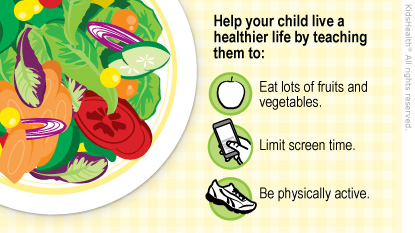High blood pressure (hypertension) in kids can lead to serious medical problems. Eating healthier, losing weight (if needed), and being physically active all can help lower blood pressure. If needed, medicine can help too. Follow these instructions to care for your child and help them lower their blood pressure.



Your child:
You know your child best. If they have symptoms that worry you, call your health care provider right away.

Your child:

What can happen if high blood pressure isn't treated? Over time, untreated high blood pressure can lead to:
What are the symptoms of high blood pressure? Usually, high blood pressure doesn't cause symptoms. But very high blood pressure can cause headaches, blurry vision, dizziness, nosebleeds, a fluttering or racing heartbeat, nausea, and other medical problems.
What causes high blood pressure? Things that make someone more likely to have high blood pressure include having other family members with high blood pressure, being overweight, certain medical conditions (such as kidney, heart, or hormone problems), an unhealthy diet, not getting enough exercise, and drinking too much alcohol. Often, the cause of a child's high blood pressure isn't known.